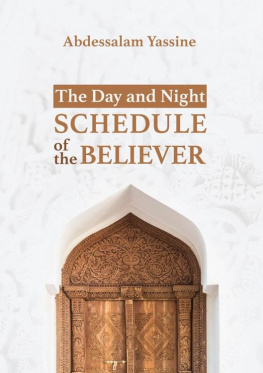Abdessalam Yassine - The Day and Night Schedule of the Believer
Here you can read online Abdessalam Yassine - The Day and Night Schedule of the Believer full text of the book (entire story) in english for free. Download pdf and epub, get meaning, cover and reviews about this ebook. year: 2020, publisher: Justice and Spirituality Publishing, genre: Religion. Description of the work, (preface) as well as reviews are available. Best literature library LitArk.com created for fans of good reading and offers a wide selection of genres:
Romance novel
Science fiction
Adventure
Detective
Science
History
Home and family
Prose
Art
Politics
Computer
Non-fiction
Religion
Business
Children
Humor
Choose a favorite category and find really read worthwhile books. Enjoy immersion in the world of imagination, feel the emotions of the characters or learn something new for yourself, make an fascinating discovery.
- Book:The Day and Night Schedule of the Believer
- Author:
- Publisher:Justice and Spirituality Publishing
- Genre:
- Year:2020
- Rating:4 / 5
- Favourites:Add to favourites
- Your mark:
- 80
- 1
- 2
- 3
- 4
- 5
The Day and Night Schedule of the Believer: summary, description and annotation
We offer to read an annotation, description, summary or preface (depends on what the author of the book "The Day and Night Schedule of the Believer" wrote himself). If you haven't found the necessary information about the book — write in the comments, we will try to find it.
The Day and Night Schedule of the Believer — read online for free the complete book (whole text) full work
Below is the text of the book, divided by pages. System saving the place of the last page read, allows you to conveniently read the book "The Day and Night Schedule of the Believer" online for free, without having to search again every time where you left off. Put a bookmark, and you can go to the page where you finished reading at any time.
Font size:
Interval:
Bookmark:
Abdessalam Yassine
The Day and Night
SCHEDULE
of
the BELIEVER
SECOND EDITION
Translated from the Arabic by:
Farouk Bouasse
Justice and Spirituality Publishing, Inc
Co pyright 2018, 2007 by Justice and Spirituality Publishing, Inc
Al l rights reserved. No part of this book may be reproduced, in any form or by any me ans, without prior written permission from the publisher.
Pr inted in China
Pu blished by Justice and Spirituality Publishing
P. O. Box 5189
Ne w Britain, PA 18901
U. S.A.
We b site: www.JSP.us
IS BN : 978-1-942482-00-0
Li brary of Congress Catalog Card Number : 2018950977
Pr inted on acid-free paper
Truly, those who succeed are those who purify it [the soul]
(Quran 91:9)
Content
For Each Time There Is an Assigned Work
In the name of God, the Most Gracious, the Most Merciful: may His blessings and peace be upon His Prophet Muhammad and the Prophets l al -Bayt .
Dear Brothers and Sisters in Faith:
The Lord - exalted is He - has proclaimed in Srat al-Mulk (67:2):
It is He Who has created Death and Life, that He may test which of you are best in deed.
Since your lifetime is your capital, it is imperative to learn how to manage each of lifes tasks in turn. The point of life is not to do whatever you want, whenever you want; rather, the point is to learn how to do the right work at the right time. Therefore, you should learn the acts of the heart that are required for their prescribed time, the acts of the tongue for their prescribed time, and the acts of all your other organs at their prescribed times. When Ab Bakr as-Siddq was nominating Umar b. al-Khab as his successor, he counseled:
Know that the Lord has commanded us to perform certain acts in the daytime, which He will not accept for us to perform at night; and so too has He commanded us to perform certain acts in the nighttime which He will not accept for us to perform in the day.
Shifting from a Worldly Affairs Mode to a Worship Mode
So how can you carry out all your obligations in such a limited lifespan so as to attain the bliss of this life and the Hereafter? In Srat an-Nahl (16:97), the Lord (magnified be He) explains:
To those who work deeds of righteousness, men or women, and have faith, We will give a life that is good and pure, and We will bestow on them their reward according to the best of their actions.
It is thus by faith and righteous deeds that felicity may be attained. As for faith, the Messenger (God bless him and grant him peace) has taught us that it is made up of seventy branches. Among these branches of faith must perform at least once in their lifetime (such as the Pilgrimage); acts that are mandatory once a year (the Ramadan fast); acts that are prescribed at regular intervals (the ritual prayer [ as-salh ] and ritual charity [ az-zakt ]); acts that are mandated under particular circumstances (visiting the sick, paying last honors to the deceased, clearing away a public pathway that has been obstructed); acts that relate to individual virtues (modesty); and finally, acts that should be made into firmly-established habits (chanting the testimony of faith that there is no god but God [ l ilha illallh ]).
The believer should cultivate habits that allow them to spend their time in worship and jihd once taught:
If anyone fails, for a single day of their lifespan, to uphold the rights of the people, fulfil the duties of their faith, gain in [spiritual] honor, earn greater merit, perform a virtuous deed, or acquire knowledge, they will deeply regret having ever lived such a day.
Of course, you should set aside time for your family and your schooling or job; but under no circumstances should you let your worldly schedule prevent you from establishing the ritual prayer in congregation as much as you can. If there is not a mosque close by, you should gather those around you in your workplace or school and have one person act as the caller to prayer ( mu adhdhin ) and another the imam to lead the worship.
What should we start and end our day with? How can we effectively shift from our worldly mode to a worship mode?
The believer should begin their day by waking up one hour before the dawn prayer (or, at the very least, a little before the dawn prayer) to perform five sets of two-cycle prayers capped by a one-cycle prayer. In this worship, the believer should manifest humility and helplessness before the Lord, for the prayer is supposed to represent total devotion to Him. This is particularly applicable for the night vigil which is the best ritual worship after the five prescribed prayers, as attested to by at least one hadth of the Prophet (God bless him and grant him peace).
Between each prayer unit, the worshipper should beseech their Lord with tears flowing down their face. They should see from themselves nothing but negligence, deficiency, helplessness, and need; they should see whatever virtues they possess as being nothing more than a gift from the Maker, praising Him for such generosity.
Truly, those who succeed are those who purify it [the soul] (91:9): The key to perfecting the soul lies in precisely recognizing its imperfection, the key to its power lies in acknowledging its very powerlessness before Him (glorified is He), while its affluence lies in seeing nothing but its poverty and dire need.
Imm Ahmad has narrated on the authority of al-Mualib that the Prophet (God bless him and grant him peace) instructed:
In the night vigil, you should end each prayer set with a recitation of the tashahhud , then stretching out your hands to form a mask , bearing your wretchedness and helplessness, and imploring: O Lord! O Lord! - for to fail to do this results in an imperfect prayer (literally: a prematurely-born baby). Shu ba then inquired: Their prayer will be imperfect? Indeed. What does it mean to stretch out your hands to form a mask ? - the Prophet demonstrated by covering his face with his hands .
In his Sahh , Ibn Hibbn reports the following statement of the Messenger (God bless him and grant him peace) on the authority of Ibn Masd (God be pleased with him):
Our Lord is amazed at two types of people. One leaves their spouse and bed [in the middle of the night] to establish the night vigil. The Lord (exalted is He) proclaims to His angels: Look at My servant who has risen from sleep and left their beloved spouse to seek My favor and out of trembling fear for My wrath!...
Upon finishing the night vigil, the believer should sit down and pray to the Lord for forgiveness. As Srat adh-Dhryt (51:17-18) describes those who will achieve the everlasting bliss of Paradise:
They were in the habit of sleeping but little by night, and in the hours of early dawn, praying (to God) for forgiveness.
2 . A Reward Equal to the Greater Pilgrimage (Hajj) and the Lesser Pilgrimage (Umra)
The time from after the dawn prayer until sunrise is a blessed one which the believer should spend reciting and memorizing Qurn and engaging in remembrance of God ( dhikr ), for this is a custom of the Prophet. Imm Ahmad and the other authors of the Sunan (books of authenticated hadths ) have reported from the Messenger (God bless him and grant him peace):
O Lord, shed your blessings on those activities of my community (umma) performed in the early morning.
In this vein, Tirmidh has related this Prophetic counsel:
Establishing the dawn prayer in congregation, sitting down to engage in remembrance of God until sunrise, and finishing this session off with a two-cycle prayer set merits the same reward as performing the Greater Pilgrimage or the Lesser Pilgrimage. (The Messenger [God bless him and grant him peace] then reiterated thrice: [A ] full and complete [pilgrimage], full and complete, full and complete .) [Recorded by Tirmidh who graded the hadths chain as fairly strong, but lacking in corroboration (hasan gharb ).]
Next pageFont size:
Interval:
Bookmark:
Similar books «The Day and Night Schedule of the Believer»
Look at similar books to The Day and Night Schedule of the Believer. We have selected literature similar in name and meaning in the hope of providing readers with more options to find new, interesting, not yet read works.
Discussion, reviews of the book The Day and Night Schedule of the Believer and just readers' own opinions. Leave your comments, write what you think about the work, its meaning or the main characters. Specify what exactly you liked and what you didn't like, and why you think so.










